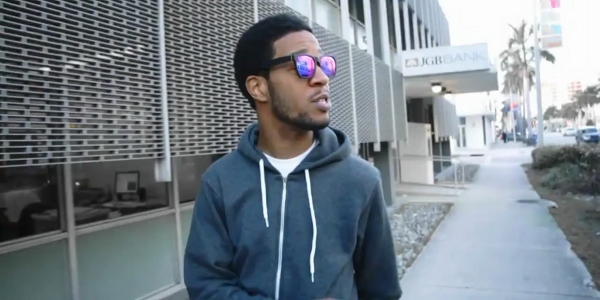“People have changed teams in the past, sure. But this was just such a major change in the way teams are run. It’s such a big deal for [LeBron James] to do that, because he could be opening the door for this to become the trend: building these super teams. Who cares where you come from? You’re just trying to build these teams in order to win a quick championship. And in a sense, it’s the end of a certain era of basketball. LeBron could have ushered in this change and that could potentially suck. As a fan of the sport and a fan of people keepin’ it real in general, I feel like there really isn’t any other option.”
Whether Gillis, a massive basketball fan, was speaking cryptically and allegorically or not, it’s hard not to read into his comments and draw a parallel. The way Gillis constructs the songs and albums he releases has drawn equal parts criticism and praise. By mashing samples containing intense hooks from some of pop’s most popular songs of the past, Gillis has created a culture that’s endorsed by club-goers yet reviled by purists he’s not so much “creating” music so much as he is constructing it based on the success of others. He’s the musical equivalent of a chef who borrows proven recipes from famous chefs, throws them together and calls it a creation all his own. Or, he creates “super songs.”
Gillis isn’t impervious to the moral dilemma associated with his music. But he isn’t hung up on how his music is perceived; Gillis is more concerned with the bigger picture. How music has changed, the direction music is headed and what caused said result.
“There’s no right or wrong way to consume music. People get hung up on being like, ‘The music of 30 years ago was right. The industry and the way people listened to music, that was right,’” he says whilst adopting a snotty tone. “But I’m more excited about a general change and people having access to anything. At any point, whether it’s the hippie movement of the ‘60s, punk in the ‘70s, hip hop in the ‘80s – that all stems from a general cultural change and the way people chose music before them, but also with the technology available. We’re definitely going through one of the biggest changes of all time with the digital revolution. Young people growing up are approaching the idea of making music in a totally different way. And to me, that’s exciting, because things definitely weren’t right per se in the ‘90s or the ‘70s or whatever. People shouldn’t listen to songs that are 20 minutes or 30 seconds long. There’s no smart or dumb version. Things are going to move forward. There will always be reactions to that. In the ‘80s, when things were shifting towards more pop music, perhaps that created the platform being set for Nirvana to come through. These things are all a result of what happened before it, good or bad.”
The current shift in the music industry towards an instant accessibility of songs certainly creates the issue of pop music being very temporary and replaceable. And Gillis is at risk of contributing to that culture; in predominantly using hooks and choruses and samples, there’s an element of attention deficiency in his musical creations which is often soaked up by his club-going fans.
Yet Gillis is a fan of long players and feels that his music is sometimes misunderstood. While he uses short samples, he’s still after a result that is more permanent and, essentially, meant to be taken in with patience.
“I like a lot of progressive rock, like Yes and Rush, where it’s very quick yet technical. That sort of music, like Yes, while it’s always changing, they still write 18 minute songs. So people would never associate it with attention deficiency. And when I make my albums, I make them as a whole. The last album was a 71-minute song to me. The only reason I broke it up was to make it easier to navigate through. I’m definitely pushing for a more long-term listening experience. To me, the albums are not about hearing a one second clip. Sure, there’s the technical aspect to it, but when I sit down to make it, I’m thinking about the beginning and the end, there’s peaks, there’s valleys. I have no problem where music is going and how it’s becoming more ‘single’ based. But with the last three records, for me, it’s been important to make something that people can listen to from beginning to end.”
Change is not always a welcome idea. But Gregg Michael Gillis seems ready not only to welcome change, but grab it by the balls. The results might not always win over everyone, sure. There is a strong element of Girl Talk that is not content to just ride the wave; he’s ready to understand what creates the wave.
“I want to make things that are good and have a fan-base, but there’s also the desire to change things. And wanting to put something there that is confrontational, maybe even in a way they don’t understand. There are people that don’t enjoy it, simply because it’s pop music. But then you’re missing a major point, because you don’t understand where it comes from.”







